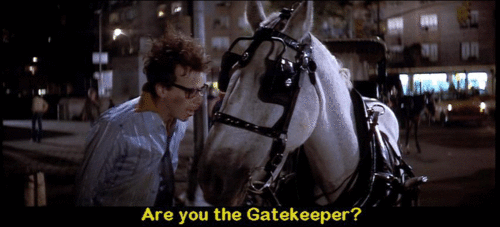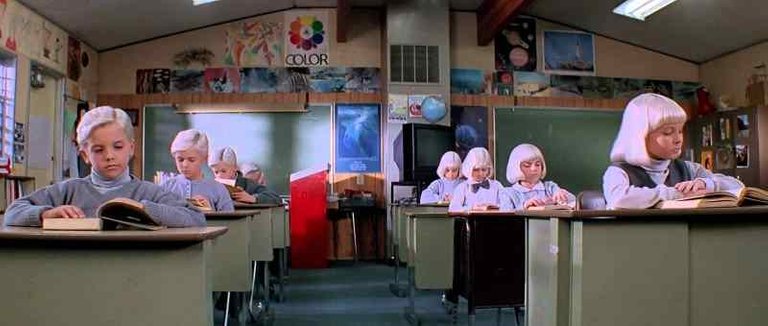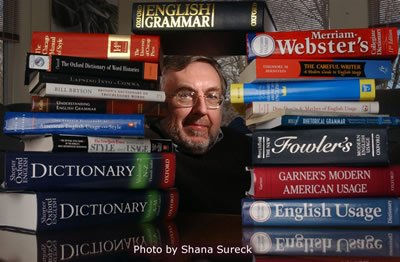
I never thought I'd need a Ghostbusters reference to explain my teaching philosophy, but here we are.
Being a teacher is something I always thought I’d enjoy and be good at, and I’d say that’s been mostly true since I started teaching at the college level a little over four years ago. It took me longer than maybe it should have to actually begin my teaching career, in part because when I was in high school, my favorite teacher told me I’d hate teaching and I took it to heart. He might have been right had I not decided to work in post-secondary education.
Fortunately for me, I switched tracks and changed my major from Education to English soon after my first observation in a high school classroom. It was terrible; I remember the moment during the observation that changed everything for me. I was in a technology classroom (I think the class had to do with computer literacy), and the teacher was having an especially hard time with one student in particular.
The class was working on wrapping up some assignment, and this student was behind, apparently because she really just did not want to do the assignment; at one point, she asked the teacher, “But why? Why do I have to do this? I don’t care about it, and it’s not going to help me, so why do I have to do it?” The teacher, obviously flustered—and no doubt embarrassed, given that I was in the room watching—snapped, “You just do. If you’d been working instead of complaining, you would’ve been done by now.” The student at least started going through the motions of working on the assignment, but she was clearly angry, and she audibly huffed and grumbled for the rest of the period, drawing stares and whispers from her classmates.
Reveal spoiler
.gif)
If you've never seen Catherine Tate's Lauren Cooper character, you should get on that.
When the teacher approached me toward the end of class to check whether I had any questions, I asked her if that sort of exchange was typical in her day-to-day. She replied that it was and, with a pained expression, told me that she had one or two students in every class who made it their business to make her life miserable by being disruptive and combative every chance they got. I asked her how she dealt with that, what she did when she was challenged about the purpose of her class, and she just shrugged and said, “They have to be here, and there’s nothing they or I can really do about it. I mostly just ignore it and put them out of class if it gets too bad.” And that was it; I didn’t want to teach anymore.
Reveal spoiler
.gif)
Same.
It wasn’t so much the prospect of working with difficult students that scared me off as much as it was the realization that I’d essentially be teaching hostages. On my way home from the observation, I thought about the time one of my high school teachers told me, in a moment of rare candor, that everything we learned through public education could easily be taught by the time we reached 6th grade, but the real purpose of school was to keep all us potential juvenile delinquents occupied and off the streets while training us to be good little citizens.

I didn’t want to be a prison warden, and I sure as hell didn’t want to be part of some sort of state-sponsored indoctrination squad. I didn’t know for sure what I was going to do, but I could no longer imagine myself teaching middle school or high school.
I felt a little lost at sea for a while, but the desire to teach returned not long after I started tutoring English at my school as a part of the work-study program. Getting to work with people one-on-one reminded me about what had drawn me to teaching in the first place: I liked using my skills to help other people build their own skills; I liked explaining the hows and the whys and seeing the lights go on when someone finally “got it”; I liked facilitating real learning with people who came to me voluntarily.
Once I started taking more classes in my major, I grew more and more confident that I had chosen the right field. And in my upper-level literature courses, I realized these were the sort of classes I needed to teach, classes where we discussed ideas and analyzed texts and explored complex concepts—classes where the students actually wanted to be there and learn. So I made the decision to get my master’s degree and started laying the groundwork to become employable in higher ed.
Reveal spoiler

Dr. Darling looks like my kinda people.
I almost jumped ship on the teaching track again when I took a pedagogy class as a grad student. We studied lots of instructional theory in that class, and most of them pushed this idea that part of a college writing professor’s job is to teach students how to be socially responsible citizens. My real problem with that was that there seemed to be this sort of subtext implying that social responsibility means unfaltering support of statism and leftist values. Maybe it was paranoia; I don’t know. But I was also troubled by the gatekeeping mentality fostered among the students in that course.
I’ve seen the gatekeepers in every corner of academia. They’re those teachers and professors who think of themselves as preserving the intellectual integrity of their institutions, bouncing the dummies and the riffraff while ushering in the cream of the crop. Gatekeepers make students’ lives tough by setting up needlessly confusing obstacle-course assignments in the name of academic rigor. They discourage students from proceeding in their educational pursuits through disparaging comments or excessively harsh grading policies. Some of them even use their classrooms simply as a venue to demonstrate their own self-proclaimed brilliance—“I’m the smartest person in this room, dammit! Pay attention to me!” Essentially, gatekeepers practice the withholding of knowledge from anyone they deem somehow unworthy.
Reveal spoiler
.gif)
Like this, only with education.
I spend a great deal of time thinking about my role as an educator, and I’ve figured out that I don’t want to be the gatekeeper. I want to be the keymaster. I want to help students unlock the floodgates of knowledge that are just waiting to be opened by anyone who seeks them. I want to help students navigate the obstacles that stand between them and their educational goals. I want to help them build their toolkits for success both in and beyond the classroom. I want to help them figure out how to think, not tell them what to think. So now I do my best to hand out as many keys as possible to as many students as I can.
Gatekeepers beware.
.gif)
I have seen the classroom and the general education system change so much over the years and, for the most part, not for the better in my opinion. Critical thinking is missing as well as independent thought and creativity.
Agreed. Each semester, I find myself trying to "deprogram" many of my students who are fresh out of high school. They spend so long drilling for standardized tests that they struggle to develop coherent original thoughts.
great...rs and upvote for u....I am goalkeeper....hehehe
Thanks :)
u r welcome...
Thanks for the post, a very interesting read. My hat goes off to anybody in education who actually wants to teach how to think and not what to think. Ideas should be challenged, not stated as facts. Unfortunately you are right in that the education system isn't necessarily geared for teaching free thinking.
Great post!
Thanks for reading! I do sometimes think I'm in direct conflict with the apparent principles of the system in which I work, but I've got hope for a paradigm shift.
Awesome post and fantastic teaching philosophy. We need more of you! Upvoted, resteemed!
Thanks much! We need all the help we can get.
Fun post. I may have to come up with my own teaching philosophy statement on here.
Thanks! I'd definitely be interested in seeing more teaching philosophies.
I don't agree with the concept of education. Not one bit. I believe we have been following the same model as the one in factories. We prepare people to be slave workers, not individual minds.
Great article.
Thanks for reading!
Your comment reminds me of a great talk given by Sir Ken Robinson that I stumbled across several years ago. I sometimes play this video for my freshman to start a discussion. Robinson raises several important points along the lines of what you're saying.
Yes, I have seen it before. Great fan of the guy. I was thinking actually to write an article about the obsoleteness of formal education.
I'd be interested in reading it. It's a topic that deserves serious discussion and consideration.
Indeed. I will keep you updated.
I'ma gate keeping, show me your id, give me you money, you shall not pass with your items unless an exchange was made...did you get everything??/ I certainly hope so!!!